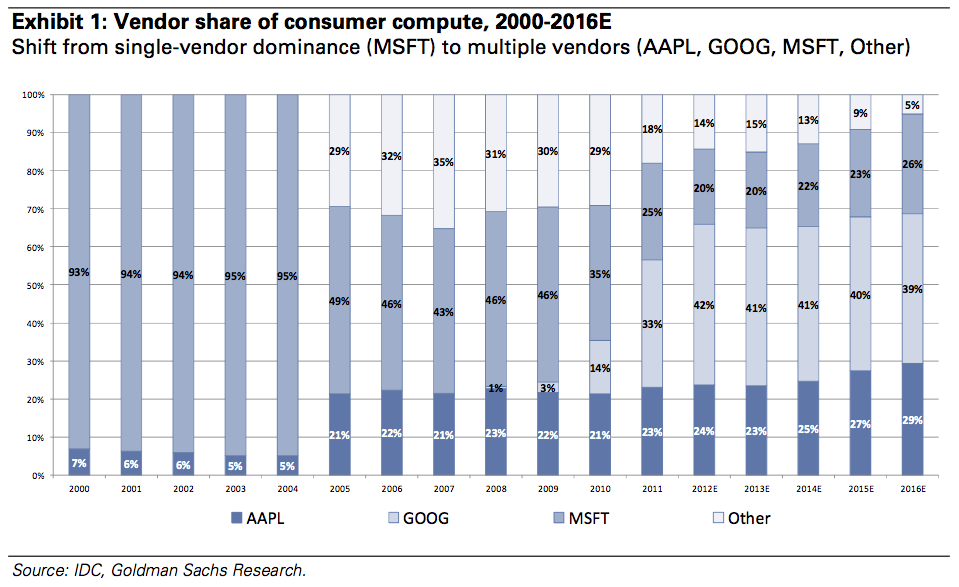Linux Now Has "Double" the Market Share of Windows
If you consider NetApplications' data set, then Linux owns only about 1 percent of the desktop OS market and Windows has almost 92 percent. But if you consider all computing platforms, including mobile, than Windows has only 20 percent and Linux has 42 percent - and that would be in the form of Google's Android alone.
Goldman Sachs recently published a chart which shows the shift from Microsoft's 95 percents hare of the computing platform market in 2004, when PCs dominated the computing landscape, to just 20 percent in 2012. The forecast suggests that Microsoft will be able to grow its share back to 26 percent by 2016 and Android will shrink to 39 percent, while Apple's iOS and MacOS X will expand from 24 percent today to 29 percent in 2016.
Much of those projections are based on crystal ball evaluations and depend especially on Microsoft's ability to establish Windows Phone and Windows RT against Android an iOS.
Contact Us for News Tips, Corrections and Feedback
Get Tom's Hardware's best news and in-depth reviews, straight to your inbox.

Wolfgang Gruener is an experienced professional in digital strategy and content, specializing in web strategy, content architecture, user experience, and applying AI in content operations within the insurtech industry. His previous roles include Director, Digital Strategy and Content Experience at American Eagle, Managing Editor at TG Daily, and contributing to publications like Tom's Guide and Tom's Hardware.
-
Linux is "free" of course companies are going to use a "free" thing over an expensive one. I just hope a better implementation of Linux is coming soon. Android is okay at best and a pile of crap at worst. And why do we have to program in Java when the hardware is ALWAYS ARM anyway?Reply
-
saturnus iOS share of market predicted to increase? I find that highly unlikely to say the least.Reply -
linux will only get bigger, it now has a lot of things going for it in the desktop space especially with Valve behind linuxReply
-
diddo "Microsoft's ability to establish Windows Phone and Windows RT"Reply
In this case, they are doomed.
Since Longhorn project they bet the company on a monolithic monster-OS needing quick and infinite performance increase, in order to get people buying costly hardware and software upgrades. That was its business plan, simply put.
In the meantime the real world shifted to mobility, and MS struggled for a decade to patch the epic disaster the new kernel and the new managed code programming paradigm was, instead of using its resources to build ground up a way out from this heck or competing on emerging markets (web, embedded, mobile, or services and research like IBM did). -
Filiprino Linux is only a kernel not an OS. Android has a totally different userspace than GNU/Linux, it does not serve to us, GNU/Linux users, having Android with that marketshare. Hell, Android devices have bad GNU/Linux compatibility thanks to the use of propietary protocols like MTP that have to be reverse engineered and hacked to work with the quirks of the poor quality software manufacturers deliver.Reply -
marcolorenzo yeeaahhh...combining the mobile platform market with the standard PC/Mac market...that's really fair. It's like saying that bicycles have a bigger market share than cars (of course, probably not in the U.S but in Europe and Asia, that would be quite likely).Reply -
diddo marcolorenzoyeeaahhh...combining the mobile platform market with the standard PC/Mac market...that's really fair. It's like saying that bicycles have a bigger market share than cars (of course, probably not in the U.S but in Europe and Asia, that would be quite likely).A PC used to cost less than a Mac and brought only a tiny fraction of the revenue per unit, but PC/Apple market share comparison was made since the beginning of time.Reply
And Netbooks were counted as PCs even if usually sold at less than half the price of an entry level PC (and less or equal to entry level smartphones!)
Comparing market share is comparing market share, not volume or revenue, so it makes sense as ONE of the business metrics.
In this case, mobile devices has prices comparable to low end of PC offer, not something completely unrelated in price like bicycles vs cars.
What is more interesting is that now anyone including MS with VistaBob 8 Squarepants, is expecting to squeeze money from the web services (say advertising, say adware-based Stores, say built in adware in browser's search and desktop/metro entries), so a low end device might even (BE EXPECTED TO) generate more revenue per unit than an high end workstation expected to do real work instead of browsing or using Apps...
Time will say what business plan is better, but sticking on the news comparing market share is a perfectly legitimate metric to take in account by itself when looking at the IT trends. -
Linux is a virus! God bless Metro! My pastor has condemmend Linux as communist filth! Only use Windows 8, and support the removal of the desktop!Reply
-
unksol So there were no phone OSes before 2005? and UNIX did not exist? Nor did linux? damn I didn't know the only options in existence were Microsoft and apple before 2005.Reply
Mmmmm..... Horrible nonsense Data from a source who can't count. So tasty. Lets draw conclusions based on it!
